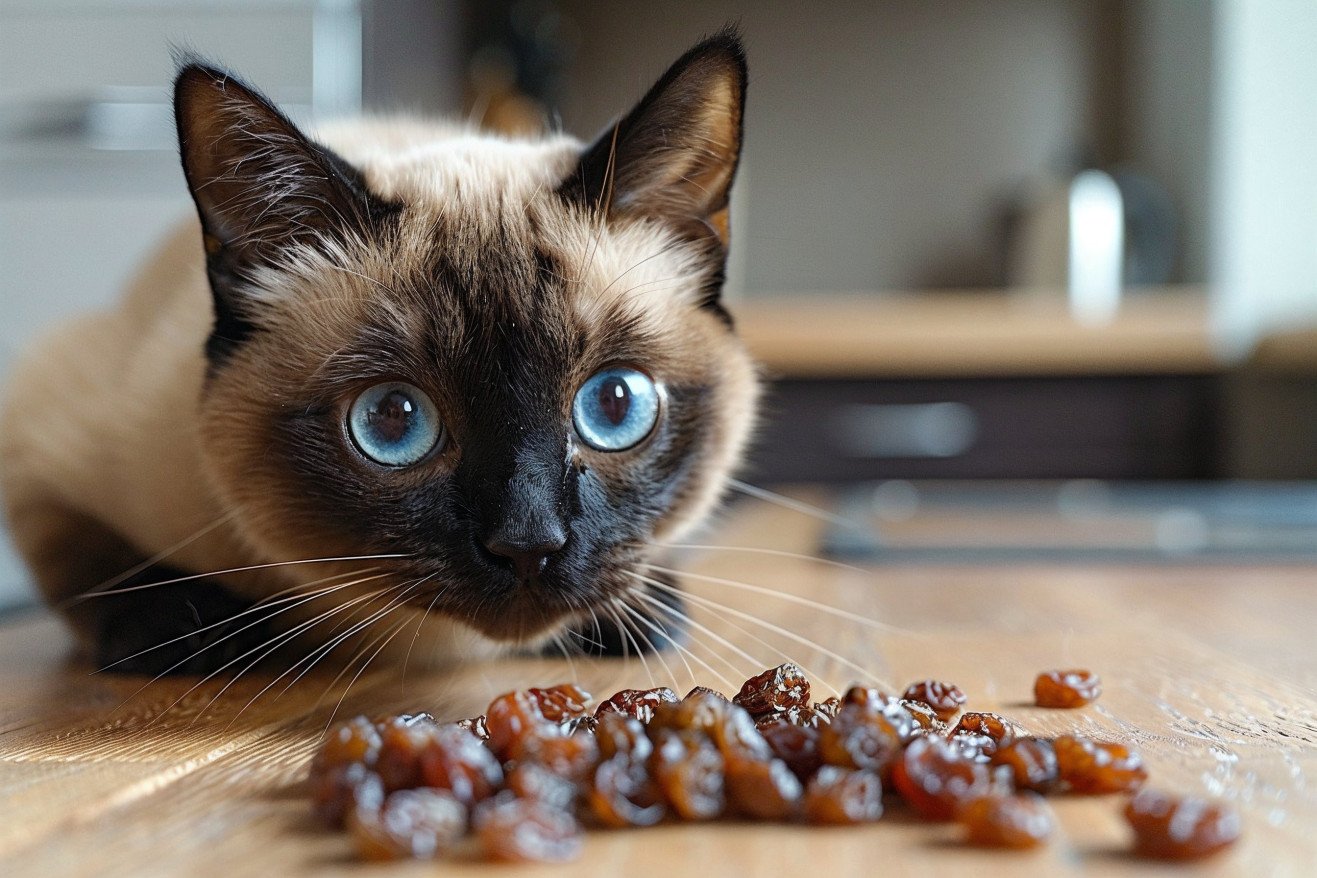Can Cats Eat Raisins? The Risks of This Potential Pet Hazard
19 May 2024 • Updated 18 May 2024

If you’re in the habit of giving your cat human food, you may be tempted to share the sweet, chewy goodness of raisins with them. However, are raisins, which are dried grapes, safe for cats to eat? No, raisins are toxic to cats and can cause kidney failure even in small doses. The substance in raisins that is poisonous to cats has not yet been identified, but even a small amount of raisins can result in severe illness and the need for emergency veterinary care. Therefore, it’s best to avoid giving your cat raisins, grapes, or any products that contain them.
Although the dangers of raisins for cats are well-documented, there are still many questions about this potential pet hazard. In the sections below, we’ll take a closer look at recent veterinary case reports and toxicological research to find out what science has to say about why raisins are so toxic to our feline friends. We’ll cover the signs of raisin toxicity, how much is toxic, and what to do if you suspect your cat has ingested raisins. Armed with this information, you can take steps to prevent raisin toxicity and know how to respond if your cat is ever affected.
Can cats eat raisins?
What Are the Symptoms and Effects of Raisin Toxicity in Cats?
If your cat eats raisins, you may notice a number of worrisome symptoms, including vomiting, diarrhea, lethargy, and abdominal pain. As noted by Wagwalking.com, these symptoms generally start to appear within 6-12 hours of eating the raisins. However, if the cat is not treated, the situation can quickly become dire.
The symptoms and potential for kidney damage are dependent on the amount of raisins the cat has eaten and the cat's individual sensitivity. While some cats may only experience gastrointestinal upset, others may develop acute kidney injury, which requires immediate veterinary intervention to avoid life-threatening complications.
If a cat has severe raisin toxicity, the kidneys can be so damaged that they go into acute renal failure. This can be fatal if the cat isn't taken to the vet immediately for aggressive supportive care and fluid therapy to help the body excrete the toxins.
Because the sooner the symptoms are recognized and the cat is taken to the vet, the better the chances of preventing long-term health issues, it's important for cat owners to understand the dangerous progression of raisin toxicity. With quick medical attention, many cats can be treated for raisin poisoning and go on to live long, healthy lives.
The Toxic Culprit: What We Know About the Compounds in Raisins That Poison Cats
Despite a growing body of research, the specific compound or mechanism of toxicity in raisins and grapes that makes them poisonous to cats has yet to be identified by veterinary scientists. In dogs, the toxic component has been identified as tartaric acid, which is found in grapes and raisins, according to ASPCApro. Other possible toxic components that have been proposed include mycotoxins, pesticide residues, and the inability of animals to metabolize certain components of the fruits, according to Vetlexicon.
Although the specific toxic component in raisins for cats has not been identified, it is clear that even small amounts of raisins can be toxic and potentially deadly. Currants and sultanas, which are dried fruits from the Vitis vinifera plant, also contain the same compounds and therefore may have similar effects on cats, according to a study in the Journal of Small Animal Practice. As more research is done, the specific toxic components and mechanisms of raisin toxicity in cats may be identified.
Emergency Response: What to Do If Your Cat Eats Raisins
If you think your cat has eaten raisins, it's important to act fast and get your cat to the vet immediately. Per Preventive Vet, the first thing you should do is call your vet or the Animal Poison Control Center to find out if you should induce vomiting or give your cat activated charcoal.
Immediate care may include inducing vomiting, giving activated charcoal to absorb the toxins, and providing IV fluids to help the kidneys. Ethos Veterinary Health East explains that in more serious cases, the cat may need to be hospitalized for observation and supportive care, which may include medications to protect the kidneys and treat kidney failure.
The sooner your cat gets help, the better the prognosis and the lower the chances of long-term kidney problems or other issues. Per Cornucopia Pet Foods, if your cat is treated quickly and given IV fluids, they can survive raisin toxicity.
Healthy Snack Alternatives: Fruits and Treats That Are Safe for Cats
While raisins and grapes are toxic to cats, there are a few fruits that cats can eat as an occasional treat. According to The Wildest, cats can eat bananas, watermelon, strawberries, and blueberries in moderation, as long as the seeds, stems, and skin are removed. Pawlicy Advisor also says that cooked or canned pumpkin that doesn't contain any spices or sweeteners can be a good option for cats.
It's also important to remember to introduce new fruits or treats slowly and in small amounts to ensure that your cat doesn't have an adverse reaction, per PetMD. It's also important to remember that while fruits and other human foods can be a good occasional treat, most of a cat's diet should be made up of commercial cat treats and a well-balanced, high-quality cat food.
Prevention and Pet Safety: How to Avoid Raisins and Other Toxic Foods for Cats
The most effective way to prevent cats from developing raisin toxicity is to avoid giving them these foods in the first place. Joii Pet Care notes that it's important to keep raisins, grapes, and any products that contain them in pet-proof containers or in places where cats can't get to them.
The Daily Paws also explains that cat owners should be careful when cooking or baking with raisins because cats can easily eat any that are dropped or spilled. It's also important to make sure that family members and guests understand that they shouldn't give cats raisins or grapes, even if they think they're giving them a special treat.
Waterdown on Vet suggests that cat owners should regularly check for and get rid of any raisins or grapes in areas where cats may have access to them, including gardens and other outdoor spaces, to help keep their feline friends safe. By following these tips, cat owners can help ensure that their cats don't develop raisin toxicity and stay as healthy as possible.
Conclusion: How to Keep Your Cat Safe and Healthy
Raisins and grapes are highly toxic to cats and should never be given to them or left within their reach. Even a small amount of these dried fruits can cause serious illness, kidney failure, and death in cats. If you think your cat has eaten raisins or grapes, take them to the vet immediately to give them the best chance of recovery.
Knowing the dangers, symptoms, and how to prevent exposure can help cat owners protect their pets from the dangers of raisins and grapes. While the exact toxic mechanism in raisins for cats is still being studied, it’s best to play it safe and avoid giving your cat these foods.


